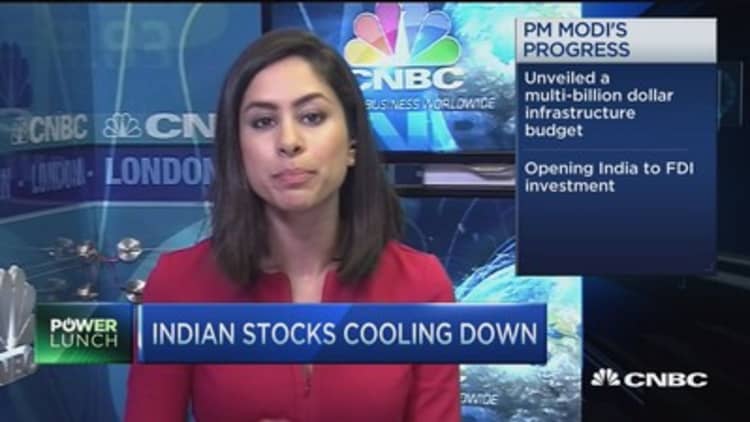Outside the Gateway of India in Mumbai, a crowd of locals with big smiles chanted "Acche din ayenge"—better days ahead—as Narendra Modi was declared the next prime minister of India.

Almost exactly a year later, some Indian market-watchers are getting impatient for better days. (Tweet This)
"Modi has been high on rhetoric and short on delivery in his first year, and his many constituencies feel they have been fed empty promises," said Manu Bhagavan, a professor of history at Hunter College in New York.
Economists and investors trumpeted Modi as a sort of Ronald Reagan of India, a man who could get down to business and prescribe the right medicine for the country's heavily regulated economy.
Global leaders have been getting in line to meet and greet Modi, who most recently visited China, where he was seen taking a selfie with Premier Li Keqiang.
"As branding exercises go, it's been a performance worthy of Madison Avenue," said Bhagavan.
Read More Oil prices and GDP: The countries that win—and lose
Clearly, many investors have been pleased with Modi—especially last year, when stocks leaped after his election. Other investors, however, were hoping that by now Modi would be done traveling around the globe promoting India, and instead getting down to reforming the economy in New Delhi.
"There's no doubt India's economy has improved, but we were expecting more after 12 months," said an Indian billionaire who spoke to CNBC on the condition of anonymity.
There's more than enough to work on. Inflation, while improved from two years ago, was still high at 6.4 percent in 2014, according to the World Bank. Corporate earnings have disappointed. Locals on the ground say India is still dealing with corruption and red tape.
Not that all of that is in Modi's control. The slow progress of reform made by Modi's BJP party is due at least in part to political pushback from the upper house of India's parliament, where Modi does not have majority of the seats. Market watchers say that hurdle will continue to hurt the prime minister's ability to enact reforms, such as liberalizing the rules around foreign direct investment in the country.
HSBC, which recently downgraded India to "underweight" from "overweight," said future interest rate cuts—and the presumed stimulus they would provide—are dependent on real economic reforms.
"The size of (Reserve Bank of India) rate cuts beyond 2015 will depend largely on structural reforms. If they materialize, there could be space to cut. But if not, the RBI may just have to sit tight," wrote Pranjul Bhandari, chief India economist, in a research note to clients.
The major other challenge facing India involves external factors, such as the price of oil. Brent crude's drop from $115 in July to near $50 earlier this year was seen as a big gift to India, a net importer of oil. Lower prices narrowed India's current account deficit, diminished inflation and led to the Reserve Bank of India's cutting rates twice this year. But with prices rebounding, analysts are unsure whether another rate cut is in the cards.
Much will depend on the amount of headway Modi makes in the coming months.
Read MoreThomas Lee: Wall Street's record run far from over
"Modi is now beginning to engage much more with the chief ministers of various states to promote growth and investment. After one year in office, he probably realizes that imposing change from the center in a diverse country like India is very difficult," said Ruchir Sharma, managing director and head of Emerging Markets Equity and Global Macro at Morgan Stanley Investment Management.
As investors reprice their expectations, the euphoria out of Indian stocks has been sucked out. The Bombay Sensex, the popular benchmark, is down on the year, after climbing nearly 30 percent in 2014.
Despite the challenges Modi faces, most portfolio managers are still bullish on India long term, citing a young talent pool, stable government and a hands-on central bank. Geoff Dennis of UBS says that given the political constraints under which Modi has to operate, his reform program should be judged over a full five-year term of office, not in the first 12 months.
"There is no reason to panic," said Dennis.
"This is a marathon, not a sprint, and it's been a good start [for Modi]," said Sam Gupta, CEO of Grand Trunk Capital.


